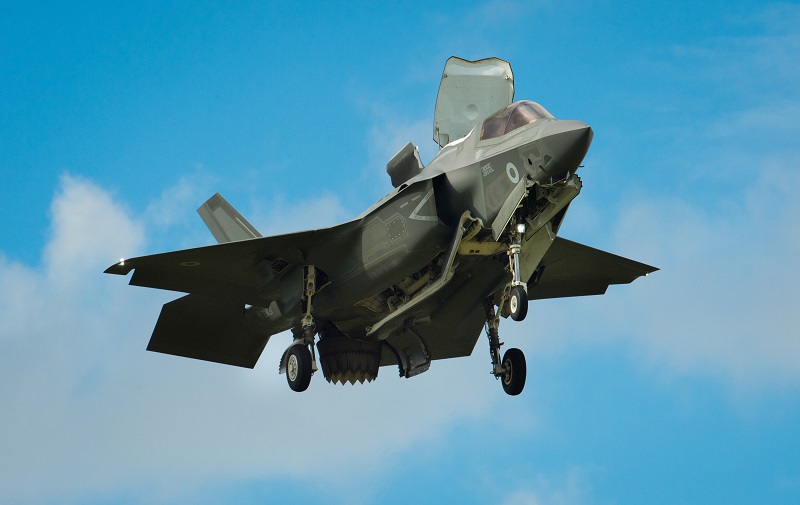“The US cannot reward Turkey to tackle a problem it created.”
The maintenance of the Caatsa sanctions and the non -reintegration of it Turkey In the fighter program F-35 Asks for the American Hellenic Institute (AHI) by letter sent to Donald Trump.
In the letter, Ahi expresses its vertical contrast to the return of Ankara to the F-35 program even if the neighboring country chooses to abandon the Russian S-400 system, the acquisition of which had led to the activation of Caatsa sanctions.
After President Trump’s telephone communication with Recep Tayyip Erdogana report by Fox News argued that the US government is working on a compromise on the Russian S-400 issue. Some of the possible scenarios that have been heard relate to partial disassembly of the system or even to transfer it to an American military base within Turkey.
However, AHI places the issue of the F-35s on a broader basis, explaining in detail the anti-compassionate and destabilizing behavior of Turkey, which, as it claims to harm the US interests. “Turkey should remove the S-400 system not to obtain bargaining benefits from the United States, but because it is its obligation to the US and NATO. The US cannot reward Turkey to tackle a problem it created. “highlighted in Ahi’s letter.
The letter of the US Hellenic Institute:
We are writing about recent publications concerning possible proposals for the reintegration of the Turkish F-35 Joint Strike Fighter fighter aircraft. Any such agreement would also require the removal of sanctions imposed on Turkey through the law on the treatment of US opponents through sanctions (Caatsa).
On the basis of these reports, we are writing you to strongly encourage you to strongly oppose any possible reintegration of Turkey to the F-35 program under any circumstances, whether it is “sealing” or the complete removal of the S-400 missile system. In addition, we invite you to support the maintenance of sanctions imposed on Turkey through the Caatsa law, as Ankara has not shown any substantial change in its policy that proves its dedication to the United States and NATO.
In 2017, Turkey signed an agreement with Russia on the acquisition of the S-400 system, despite the clear and repeated US warnings at the highest level that the market for this system would endanger the safety of US military technology and staff, would fund the Russian and Russian sector. As a result, during your first term as president of the United States, the US has imposed sanctions on Turkey through the Caatsa law and ended its participation in the F-35 program.
Turkey had received clear and repeated warnings that it would be eliminated from the F-35 program if it were marketing the S-400, but chose to do so anyway. If she is now allowed to reintegrate into the program and lifted the sanctions merely by removing the system, the message will be sent that her original decision to acquire it will remain unpunished. Turkey should remove the S-400 system not to obtain negotiating benefits from the United States, but because it is its obligation to the US and NATO. The US cannot reward Turkey to tackle a problem it has created.
In addition, there is no guarantee that Turkey will not re-conquer or reactivate the S-400 after acquiring the F-35s. It will also be extremely difficult, both at the operational and diplomatic level, to ensure that the F-35s will be used by Turkey in accordance with the US legal framework.
It is likely, if not certain, that if Turkey acquires F-35, it will use them in violation of US law. For example, there are reports that Turkey used the F-16 of American origin during the Azerbaijan war with Armenia in the Nagorno-Karabah conflict. In addition, Turkey has carried out illegal overflows over the Greek territory with its F-16s. The use of US weapons by Turkey for purposes other than its self -defense is a violation of the ARMS Export Control Act law, which stipulates that US weapons should be used exclusively for legal self -defense.
Turkey continues to use US weapons for the military occupation of the Republic of Cyprus. As stated in the title 22, paragraph 2373 of the Code of Laws of the United States, Congress found that “40,000 Turkish soldiers are parked in the occupied part of Cyprus”, using equipment that includes “weapons supplied by the United States through mainland Turkey”.
Regardless of the fate of the S-400 system, Turkey’s recent and timeless actions prove that it has diverged significantly from US policy and, therefore, should not be granted F-35 aircraft nor the sanctions imposed through the CAATSA law. Turkey continues: attacking the Syrian Democratic Forces (SDF) supported by the US, endangering the fight against ISIS, continues to provoke US allies, such as Israel, Greece and the Republic of Cyprus, to provide economic, logistical and political support to the US and political support, States.
In addition, according to the US Foreign Ministry, Turkey continues to present “serious issues of human rights”, such as arbitrary executions, torture, restrictions on press and expression, and the suppression of the opposition. Based on these actions, which are contrary to the values and interests of the United States, Turkey is not able to receive the F-35s or to see Caatsa’s sanctions.
Therefore, we ask you:
- Carefully oppose any action that would allow Turkey to reintroduce the F-35 Joint Strike Fighter program.
- Continue to encourage Turkey to remove the S-400 system-not in return for concessions from the United States, but because its acquisition was initially opposed to US interests.
- Continue to oppose the lifting of sanctions imposed on Turkey through the Caatsa law.
